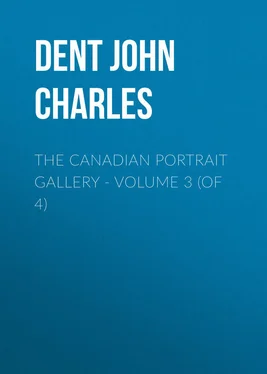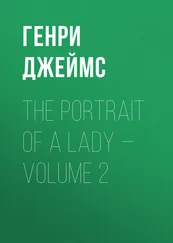John Dent - The Canadian Portrait Gallery - Volume 3 (of 4)
Здесь есть возможность читать онлайн «John Dent - The Canadian Portrait Gallery - Volume 3 (of 4)» — ознакомительный отрывок электронной книги совершенно бесплатно, а после прочтения отрывка купить полную версию. В некоторых случаях можно слушать аудио, скачать через торрент в формате fb2 и присутствует краткое содержание. Жанр: foreign_antique, foreign_prose, на английском языке. Описание произведения, (предисловие) а так же отзывы посетителей доступны на портале библиотеки ЛибКат.
- Название:The Canadian Portrait Gallery - Volume 3 (of 4)
- Автор:
- Жанр:
- Год:неизвестен
- ISBN:нет данных
- Рейтинг книги:5 / 5. Голосов: 1
-
Избранное:Добавить в избранное
- Отзывы:
-
Ваша оценка:
- 100
- 1
- 2
- 3
- 4
- 5
The Canadian Portrait Gallery - Volume 3 (of 4): краткое содержание, описание и аннотация
Предлагаем к чтению аннотацию, описание, краткое содержание или предисловие (зависит от того, что написал сам автор книги «The Canadian Portrait Gallery - Volume 3 (of 4)»). Если вы не нашли необходимую информацию о книге — напишите в комментариях, мы постараемся отыскать её.
The Canadian Portrait Gallery - Volume 3 (of 4) — читать онлайн ознакомительный отрывок
Ниже представлен текст книги, разбитый по страницам. Система сохранения места последней прочитанной страницы, позволяет с удобством читать онлайн бесплатно книгу «The Canadian Portrait Gallery - Volume 3 (of 4)», без необходимости каждый раз заново искать на чём Вы остановились. Поставьте закладку, и сможете в любой момент перейти на страницу, на которой закончили чтение.
Интервал:
Закладка:
Upon the completion of his term of office Mr. Morris returned from Manitoba to his native town of Perth, in Ontario, where he had a residence. At the last general election for the House of Commons, in 1878, he contested the constituency of Selkirk, Manitoba, with the Hon. Donald A. Smith, but was defeated by nine votes. Mr. Smith was, however, unseated on petition. About two months later the Hon. Matthew Crooks Cameron, who sat in the Local Legislature of Ontario for East Toronto, was appointed to a Puisné Judgeship of the Court of Queen's Bench. This left a vacancy in the representation of East Toronto, and Mr. Morris, who was then a resident of Perth, was nominated for the vacancy by a Conservative Convention. He offered himself as a candidate for the constituency, and was elected by a considerable majority over his opponent, Mr. John Leys. At the general local elections held on the 5th of June following Mr. Morris was again returned for East Toronto — of which he had in the interval become a resident — by a majority of 57 over the Hon. Oliver Mowat, Premier of Ontario. He continues to represent that constituency, and occupies a prominent place as a member of the Opposition.
Mr. Morris has also made a creditable name for himself in literature. In 1854 he published a quasi-professional work embodying the Railway Consolidation Acts of Canada, with notes of cases. In 1855 appeared "Canada and Her Resources," an essay to which was awarded the second prize offered by the Paris Exhibition Committee of Canada — the first prize having been awarded to the well-known essay by the late Mr. John Sheridan Hogan by Sir Edmund Head, then Governor-General. Three years later — in 1858 — he delivered a lecture before the Mercantile Library Association of Montreal, in which was predicted the federation of the British American Provinces and the construction of the Intercolonial and Pacific Railways — subjects to which Mr. Morris had given a good deal of attention ever since, when a youth, he had read and studied Lord Durham's famous "Report" on Canada. This lecture was published, in pamphlet form, under the title of "Nova Britannia; or, British North America, its extent and future," by the Library Association. It was widely circulated, and attracted a good deal of attention, not only in this country but in Great Britain and the United States. No fewer than three thousand copies of it were sold in ten days. A contemporary notice of this pamphlet thus refers to the author and his theory: "Mr. Morris is at once statistical, patriotic and prophetic. The lecturer sees in the future a fusion of races, a union of all the existing provinces, with new provinces to grow up in the west, and a railway to the Pacific. The design of the lecture is excellent, and its facts seem to have been carefully collected." In 1859 Mr. Morris delivered and published another lecture of a somewhat similar nature, under the title of "The Hudson's Bay and Pacific Territories," advocating the withdrawal of the North-West Territories from the rule of the Hudson's Bay Company, and their incorporation with the Confederacy of Canada along with British Columbia. His latest work, published during the month of May last, is entitled, "The Treaties of Canada with the Indians of Manitoba and the North-West Territories." It gives an account of all the treaties made with these Indians, from the original one made by Lord Selkirk down to the present time; contains suggestions for dealing with them, and predicts a hopeful future for them.
Mr. Morris has for many years taken an active part in the Church Courts of, first, the Presbyterian Church of Canada in connection with the Church of Scotland, and since the union of the four Presbyterian Churches of the Dominion as the Presbyterian Church in Canada, as a representative to the Assembly of that Church. He has been for twenty years a Trustee of Queen's College, Kingston, of which his father was one of the active founders. Mr. Morris actively assisted in bringing about the union of the Churches above alluded to, affirming it to be in the highest interests of Presbyterianism and religion in the Dominion that such a consummation should be brought about.
THE HON. THOMAS TALBOT
Not often does it fall to the lot of the biographer to chronicle a more singular piece of history than is afforded by the life of the founder of the Talbot Settlement in Western Canada. A contemporary writer has proved to us that Ireland has, at one time and another, contributed her full share of notable personages to our population; and Colonel Talbot is certainly entitled to rank among the most remarkable of them all. A man of high birth and social position, of good abilities, with a decided natural turn for an active military career, and with excellent prospects of success before him, he voluntarily forsook the influences under which he had been reared, and spent by far the greater part of a long life in the solitude of the Canadian wilderness. He was the early associate and life-long friend of the illustrious Duke of Wellington. At the outset of their careers, any impartial friend of the two youths might not unreasonably have predicted a higher and wider fame for the scion of the House of Talbot than for Arthur Wellesley; for the former was the brighter, and apparently the more ambitious of the two, and his connections were at least equally influential. Had any one indulged in such a vaticination, however, his prediction would have been most ignominiously falsified by subsequent events. Arthur Wellesley lived to achieve a reputation second to that of scarcely any name in history. He became the most famous and successful military commander of modern times. Nations vied with each other in heaping well-deserved honours upon his head, and his Sovereign characterized him as "the greatest general England ever saw." Statesmen and princes hung upon his words, and even upon his nod; and lovely women languished for his smiles. When he died, full of years and honours, and everything of good which a grateful nation has to bestow, his body lay in state at Chelsea Hospital. It was visited by the high and mighty ones of the Empire, and was contemplated with an almost superstitious awe. It was finally borne with regal pomp, through streets draped in mourning, and thronged by a countless multitude, to its final resting-place in the crypt of the noblest of English cathedrals. The funeral rites were solemnized amid the tears of a nation, and formed an event in that nation's history. The obsequies of "the Iron Duke" took place on the 18th of November, 1852. In less than three months from that date his friend Colonel Talbot also went the way of all flesh. But by how different a road! His life, though it had by no means been spent in vain, had had little to commend it to the emulation or envy of mankind. Its most vigorous season had been passed amid the solitude of the Canadian forest, and in its decline it had become the prey of selfishness and neglect. Colonel Talbot died in a small room in the house of a man who had once been his servant. He must have tasted the bitterness of death many times before he finally entered into his rest. Neither wife, child, nor relative ministered to his wants. But scant ceremony was vouchsafed to his remains. His body, instead of lying in state, was deposited in a barn, and was finally attended to its last obscure resting-place in a little Canadian village by a handful of friends and acquaintances. The weather was piercingly cold, and we may be sure that the obsequies were not unnecessarily prolonged. Surely the force of antithesis could not much farther go!
And yet, as we review the widely diverse careers of these two remarkable men, it is difficult to arrive at any other conclusion than that the result in each case was the legitimate outgrowth of their respective qualities. Arthur Wellesley, in his earliest boyhood, formed a definite purpose in life; and that purpose, during all the years of his probation, was kept constantly in view. Every other passion was kept in due subordination to it. Fortune was kind to him, and he well knew how to avail himself of her favours. The acquisition of fame, moreover, bears some analogy to the acquisition of wealth. The first step is by far the most difficult. Dr. Johnson once said that any man of strong will has it in his power to make a fortune, if he can only contrive to tide over the time while he is scraping together the first hundred pounds. Arthur Wellesley, having got his foot firmly on the first rung of the ladder, found the rest of the ascent feasible enough. Now, Thomas Talbot was endowed by nature with a will so strong as almost to deserve the name of stubbornness, but that was almost the only quality which he shared in common with his friend. If he ever formed any definite scheme of life he was certainly very inconsistent in pursuing it. His moods were as erratic as were those of the hero of Locksley Hall. He was unable to bring his mind into harmony with the inevitable, and knew not how to subordinate himself to the existing order of things. Even as an army-officer he was not always amenable to discipline. The follies and frivolities of society disgusted him, and his mind early received a warp from which it never recovered. He lived in a time when there was plenty of work ready to his hand, if he would but have condescended to take his share of it. The work, however, was not to his taste, and his ambition seems to have deserted him at a most inopportune time. He "burst all links of habit," withdrew himself from his proper place in the world, and passed the rest of his days in solitude and obscurity. As the founder of an important settlement in a new Province, he certainly accomplished some good in his day and generation. The enterprise, however, does not seem to have been undertaken with any definite design of accomplishing good, but merely with a view to securing a more congenial mode of life for himself. That a man reared as he had been should find anything congenial in such a life is a problem which is insoluble to ordinary humanity.
Читать дальшеИнтервал:
Закладка:
Похожие книги на «The Canadian Portrait Gallery - Volume 3 (of 4)»
Представляем Вашему вниманию похожие книги на «The Canadian Portrait Gallery - Volume 3 (of 4)» списком для выбора. Мы отобрали схожую по названию и смыслу литературу в надежде предоставить читателям больше вариантов отыскать новые, интересные, ещё непрочитанные произведения.
Обсуждение, отзывы о книге «The Canadian Portrait Gallery - Volume 3 (of 4)» и просто собственные мнения читателей. Оставьте ваши комментарии, напишите, что Вы думаете о произведении, его смысле или главных героях. Укажите что конкретно понравилось, а что нет, и почему Вы так считаете.












